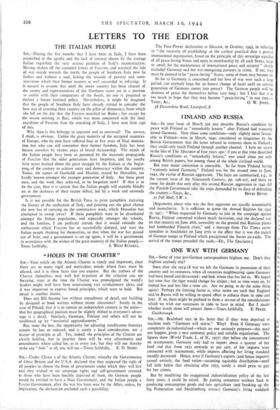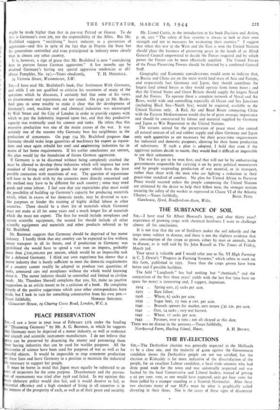Snt,—Mr. Brailsford says in his letter that if they were
deprived of machine tools "Germans will starve." Why? Even if Germany were completely de-industrialised—which no one seriously proposes—this need not happen, given a new economic policy and suitable organisation. The figures show (World Trade, L. of N., 1937) that before she Concentrated on rearmament, Germany only had to import about a quarter of her food and that from 1932 onwards 50 per cent, of her imports were connected with rearmament, while imports affecting her living standard steadily decreased. Hence, even if Germany's exports (and hence imports) ceased entirely, the food ration—assuming equitable distribution—need fall little below that obtaining after 1933, surely a small price to pay for her crimes.
But by modifying the exaggerated industrialisation policy of the last forty years, it could be raised. By putting armament workers back to producing consumption goods and into agriculture (and breaking up the big Pomeranian and Mecklenburg estates) Germany's living standard might be made higher than that in pre-war Poland or Greece. To do this is Germany's own job, not the responsibility of the Allies. But Mr. Brailsford suggests " socialising " heavy industry as a prevention of aggression—and this in spite of the fact that in Prussia the State has for generations controlled and even participated in industry more closely than in almost any other country.
It is, however, a sign of grace that Mr. Brailsford is now "considering how to prevent future German aggression." A few months ago he doubted Germany's having any special aggressive tendencies at all!
(Peace Pamphlet, No. 19.).—Yours obediently, T. H. MINSHALL. 34 Victoria Street, Westminster, S.W.



























 Previous page
Previous page